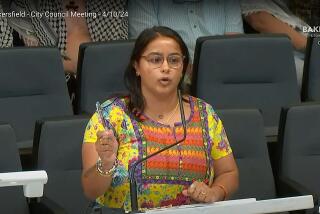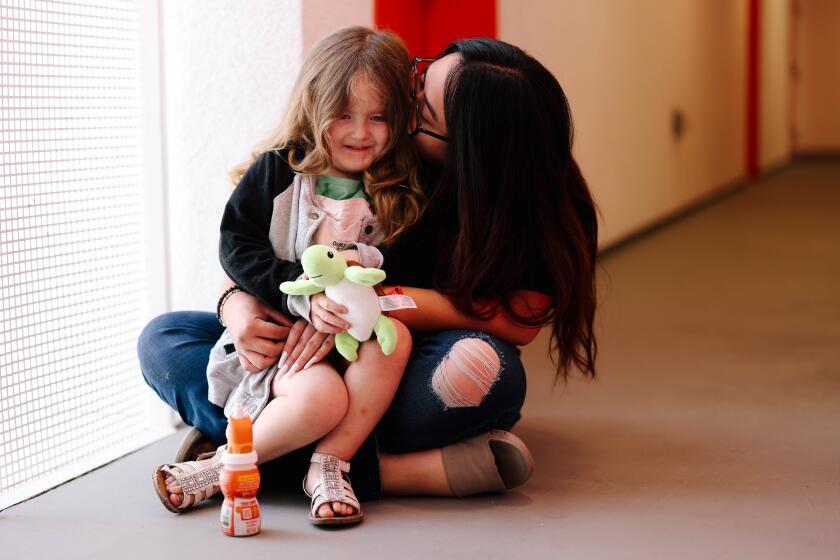Jury acquits former deputy
A former San Bernardino County sheriff’s deputy who fired on an unarmed, off-duty Air Force police officer last year -- a videotaped shooting that drew outrage when it was aired nationwide -- was acquitted Thursday of attempted voluntary manslaughter.
Ivory John Webb Jr., 46, the son of a former Compton police chief, was the first law enforcement officer to face criminal charges for an on-duty shooting in San Bernardino County. Webb, also acquitted of assault with a firearm, would have faced up to an 18-year prison sentence if he had been convicted.
After the verdict was read, an emotional Webb bearhugged his lead attorney, Michael Schwartz, with tears streaming down his face. As family members hugged one another, he pointed toward the sky and then put his raised hands together in prayer.
“I feel great.... I want to thank God first and foremost,” Webb said. “I also want to thank the jurors, who came to an honest conclusion after considering all the facts.”
The jury of eight men and four women spent less than half a day deliberating after the four-week trial in the San Bernardino courtroom. The case was dominated by the video footage of the Jan. 29, 2006, shooting on a residential street in Chino, as well as by dueling experts on police tactics and use of deadly force.
Outside the San Bernardino County courtroom, jurors said they were swayed more by the volatile, dangerous situation the suspects created during the high-speed chase than by the video.
“Police officers have to be given the right to make their decisions,” said juror Richard Day, 43, of Highland. “If they make a bad decision in the line of duty, should we hold them responsible for that to the point that we incarcerate them for it? I don’t think so.”
The jury was composed of eight whites, three blacks and one Latino.
Deputy Dist. Atty. R. Lewis Cope said he was disappointed but that “we have to honor and respect the verdict.”
“We were very confident in our case,” Cope said. If it were to be retried, he said, “I’m not sure it would be done differently.”
The prosecution’s case focused on 1 minute and 15 seconds of raw, shadowy video, recorded about 10:30 p.m. on the night of the shooting. The tape showed Webb towering over Elio Carrion and then opening fire as Carrion appeared to be following his order to get up from a sprawled position on the pavement.
Carrion, 23, has returned to duty at Barksdale Air Force Base in Louisiana after a long rehabilitation from his three gunshot wounds. His relatives gathered at the family home in Montclair, where a photo of Carrion in his military camouflage and beret was propped up against the side of the house. Carrion’s godmother and aunt, Connie Madrigal, said the family was shocked.
“It’s not going to end here,” she said, accusing the jury of not taking the case seriously. “Everybody sees the film and knows it’s not right.”
“Where is the justice?” said Carrion’s father, Heliodoro, who had driven with his wife, Carmen, from their home in Golden Valley, Ariz. “Everyone can see what happened.... We’re in the United States.... You are supposed to have justice.”
Carmen Carrion said Carrion’s wife told her that when Elio heard the news, he went to his room and didn’t want to speak to anyone. The family said they would gather at the U.S. attorney’s office Monday to press federal attorneys to pursue a civil rights case against Webb.
In January 2006, the senior airman was home on leave after a six-month tour in Iraq and had been drinking with family and friends. Carrion left the party in a Corvette driven by a friend, who led Webb and another deputy on a chase that topped 100 mph through residential neighborhoods.
The chase ended when the Corvette crashed into a wall. Carrion jumped out of the car and onto the ground.
In freeze-frames of the video shown countless times by the defense, Carrion raises his left hand toward Webb at least twice. He testified that he may have been trying to shield his eyes from Webb’s flashlight.
Though Webb had told him repeatedly to keep his hands on the ground, Carrion then appeared to use his right hand to gesture as he told Webb several times, “We’re here on your side” and “We mean you no harm.”
Carrion then told Webb he had more training in the military and the police than the deputy did. “You ... believe me, all right?” Carrion said as he pointed toward his chest.
Webb then appears to tell Carrion twice to “get up.” When Carrion says, “OK, I’m getting up” and starts to rise, Webb shoots him three times.
Because of the video, the case initially drew comparisons to the 1991 beating of Rodney King by Los Angeles police officers. Those comparisons quickly dissipated, however, because the criticism of Webb centered on the use of excessive force, not allegations of racism. Webb is black and Carrion is Latino.
The prosecutor leaned heavily on the testimony of police tactics experts, arguing that the tape showed an angry deputy whose repeated tactical errors -- including approaching two potentially dangerous subjects without waiting for backup -- led him to fire on Carrion without provocation.
Joe Callanan, a former Los Angeles County sheriff’s lieutenant who trained officers on the use of force during 22 years with the department, said Webb engaged in “extraordinarily risky” behavior and shouldn’t have left the safety of his patrol car.
During his testimony, Callanan also insinuated that Webb’s decision to fire his weapon was a “deliberate” act -- not a panicked response -- because the deputy paused for at least half a second between each of the three shots he fired.
However, an expert witness for the defense told jurors that Webb was clearly justified in shooting because, as the video recording showed, Carrion appeared to reach into his jacket -- potentially for a weapon -- just before the deputy opened fire.
“There were a couple of times where [Webb] would have been justified in firing,” Inglewood Police Sgt. Kent Ferrin testified. “He showed great restraint.”
Webb’s lead attorney, Schwartz, said Carrion endangered Webb’s life and the lives of others by failing to stop his drunk friend from leading police on a chase.
Schwartz said that Webb fired in self-defense not just because of one movement by Carrion, but because of a combination of threatening movements in a pattern of noncompliance by the airman -- an assessment some jurors agreed with.
Webb “didn’t know anything about these people,” said juror Linda Goldstein, 58, of San Bernardino. “They were belligerent. If they had kept their mouths shut and obeyed what he had told them to do -- none of this would have happened.”
Goldstein said jurors took a preliminary vote on the attempted voluntary manslaughter charge less than two hours after they began deliberating and every juror said Webb was not guilty.
Webb initially told detectives that Carrion had lunged at him after ignoring orders to stay on the ground. Several days later, after watching the video, Webb told detectives he believed Carrion was reaching for a weapon when he fired.
During the trial, the prosecutor seized on those conflicting statements, saying it showed Webb had initially tried to deceive investigators and then was forced to change his story when he realized the shooting was caught on tape.
Webb’s attorney dismissed the prosecutor’s claims, arguing that the video showed Carrion reached toward the jacket and lunged.
After the verdict, Schwartz said it was a tough case to fight from the very beginning.
“We started out way behind the eight ball, with people seeing snippets of the tape and not having anything close to the full story,” he said.
Webb, who left the Sheriff’s Department a few months after the incident, still must contend with a federal lawsuit Carrion filed against Webb and the San Bernardino County Sheriff’s Department.
He alleges that Webb tried to kill him and that the deputy’s supervisors deliberately kept ambulances from reaching him, exacerbating his injuries.
Thom Mrozek, a spokesman for the U.S. attorney’s office, also said federal attorneys had not made a decision about whether to pursue a civil rights case against Webb.
“We were monitoring the state court prosecution, and we will review the matter to determine if a federal investigation is warranted,” Mrozek said.
--
Times staff writers Jonathan Abrams and Sara Lin contributed to this report.
More to Read
Start your day right
Sign up for Essential California for news, features and recommendations from the L.A. Times and beyond in your inbox six days a week.
You may occasionally receive promotional content from the Los Angeles Times.







